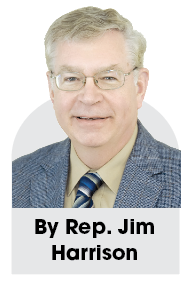 When the online news outlet VTDigger featured a photo of me welcoming the governor entering the House Chamber for his annual budget address (seen above), I couldn’t help using it to my advantage in a “fun” way. With some technical help, we printed out a copy, which I autographed and presented it to the governor at his weekly coffee hour. I’m not sure what he made of it and expected it to disappear after I left. However, I learned from an unnamed source that the photo was still there 24 hours later prominently displayed next to his desk in his State House office. Who knows, maybe it will even be there when I return this week?
When the online news outlet VTDigger featured a photo of me welcoming the governor entering the House Chamber for his annual budget address (seen above), I couldn’t help using it to my advantage in a “fun” way. With some technical help, we printed out a copy, which I autographed and presented it to the governor at his weekly coffee hour. I’m not sure what he made of it and expected it to disappear after I left. However, I learned from an unnamed source that the photo was still there 24 hours later prominently displayed next to his desk in his State House office. Who knows, maybe it will even be there when I return this week?
Speaking of the budget address, as he did in his State of the State, the governor asked lawmakers to work with him to address the core challenges of affordability, public safety, and housing. He urged the Legislature to recognize the budget pressures in a year after record spending and with pandemic aid drying up.
Reminding the legislators about past vetoes they overrode, such as the annual budget last June, and he remarked that they don’t have to listen to his objections or consider his priorities, seemed to hit a nerve with leaders.
Speaker Krowinski said to reporters after his speech, “To hear jabs throughout this speech at policies that we’ve worked on and had tripartisan support on isn’t helpful… And it’s not a good way to start off how we’re going to collaborate on the budget.”
While reiterating his call for not raising taxes, Scott went on to say, “Every penny we spend comes out of the pockets of the people who live, work and invest in Vermont.”
In his administration’s plan for the upcoming year, base spending is increased a modest 3.57%. This contrasts with the overall increase of 13%, (some of which were one-time expenditures), approved last year.
On the education front, the governor stressed the importance of literacy and career and technical education and mitigating the estimated statewide average 17.3% increase in property taxes. He cautioned against raising other taxes for education, likening it to just taking it out of another pocket.
On public safety he now says he has second thoughts on some bills he signed in the past to raise the age of criminal accountability and change the bail laws. And he wants stronger penalties for drug dealers.
Other issues of interest:
The House approved the annual budget adjustment bill on Friday, Jan. 26, for the current year, increasing spending by $30 million beyond what the governor recommended. Some of it was for extending the hotel program and providing municipal flood relief. In a press release Friday afternoon, House leaders praised the bill’s investments that address critical issues facing Vermonters.
A House committee advanced S.18, which bans flavored tobacco and vape products effective January 2025. After concerns were raised that menthol flavored products were disproportionally used by persons of color and members of the LGBTQ+ community, the committee delayed the menthol ban until July 2025 to give the Health Equity panel an opportunity to report back with a recommendation.
The chair of the House Ways & Means Committee, Rep Kornheiser, D-Brattleboro, unveiled a list of possible new taxes last week: including a 3% surcharge on household incomes over $500,000; adding the sales tax to online software; a personal income tax on unrealized capital gains; and a change in how corporate taxes are calculated. It is anticipated that these taxes will be used to mitigate some of the expected increase in property taxes and/or the state budget.
The Senate Transportation Committee is considering legislation that would make it easier for law enforcement to use automatic license plate readers (cameras) in work zones to help reduce speeding.
The Vermont Senate failed to override the governor’s veto of the bottle bill expansion on a 17-13 vote (20 votes needed). Scott vetoed the measure saying he believed it would increase costs of recycling and raise prices of beverages. Advocates of the expansion to wine, juice and other drinks believed it would increase return rates.
Attorney General Charity Clark announced a settlement reached with hotels owned by Anil Sachdev, who participated in the motel program for homeless individuals, to the amount of $300,000. At issue was the return to participants of the $3,300 security deposits paid by the state on their behalf.
And for a bit more in the “fun” but romantic category, read the story in VTDigger called “Final Reading: Operation Engagement,” which can be found here: tinyurl.com/245s3c6y.
Jim Harrison is the state representative for Chittenden, Killington, Mendon and Pittsfield. He can be reached at [email protected] or harrisonforvermont.com.



